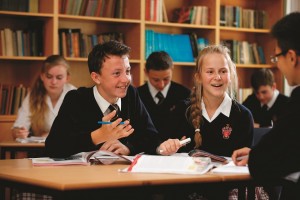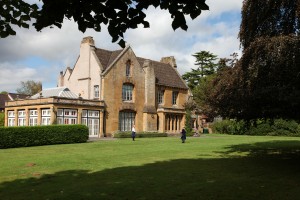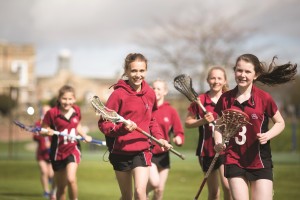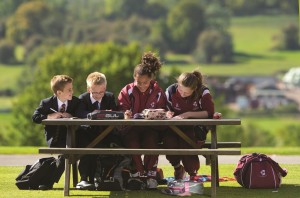 Find out why the country’s boarding schools are safe, happy places for maximum achievement and personal development
Find out why the country’s boarding schools are safe, happy places for maximum achievement and personal development
There has never been a better time to become a boarder at a British boarding school. Standards in education and in pastoral care have probably never been higher, and today’s discriminating and demanding parents will find that schools match their expectations, aiming to provide the very best environment in which a child can grow and learn.
Children, too, are aware that a boarding education can offer them the best of both worlds – at school and at home – and are almost always prime movers in the decisions that families make about the most appropriate school for them. For international students, immersion in an English-speaking environment from an early age can make the difference between technically accurate command of the language and confident, natural fluency. In today’s global market, this can be a huge advantage.
Since 2010, an independent boarding school must be licensed as a ‘Tier 4 Sponsor’ to be able to sponsor students from outside of the UK. (The approved list of Sponsors is available here).
Students from EEA countries may also join state boarding schools or academies, which charge for boarding but provide free education, making costs for parents significantly less. These schools cannot admit or sponsor students who do not have EEA nationality or right of residence in the UK or who need a Tier 4 visa to be able to study in the UK.
 A home away from home
A home away from home
Schools work hard to make the transition from home to school as smooth as possible, especially if a child is coming from overseas. A seven-year-old is likely to find him or herself sharing a large bedroom with up to half a dozen other youngsters, but having his or her own private space, with a wardrobe and locker and sometimes a built-in desk. The combination of private space, which children are encouraged to personalise, and company is important for helping children build friendships which may last a lifetime. This companionship, coupled with a busy life outside the classroom as well as within it, and easy contact with parents, helps a child to weather the early days of missing home and begin to enjoy all that school life has to offer.
Children learn to understand different peoples and different cultures by making friends and living in a thriving community based on mutual respect, an excellent preparation for the adult world. International students will make progress in English by leaps and bounds, not just because of the expert tuition, but also because of the close daily contact and shared activities with English-speaking pupils.
Older children are likely to find the numbers in their bedrooms diminish, with perhaps two or three sharing up to the age of 16, and single study-bedrooms – often with en-suite facilities – rapidly becoming the norm for sixth-form students preparing for university. The older the students, the more likely they are to have established their friendships and the more likely it is that they will wish to spend more time studying: there may be fewer people in the room, but the desks will be larger, the shelves more laden.
At all ages of boarding, schools offer comfortable, pleasant accommodation, with single study-bedrooms frequently larger than those at university. Communal areas, such as common rooms and, for older pupils, kitchens, are well equipped and have the advantage of staff supervision, ensuring that students learn to respect other users and the facilities at their disposal.
All of this will be overseen by friendly, professional, committed and dedicated houseparents, for whom the happiness of the boarding house depends upon the happiness of individual boarders and the strength of the relationships they build with each other. Often, they become the most significant people in a child’s boarding life and they take that privilege very seriously indeed.
 A busy life
A busy life
Access to school facilities after the teaching day is a major benefit for boarding pupils and homework for younger pupils will be supervised. School libraries are valuable resources in the evenings or at weekends, reminding pupils of the wisdom on their shelves as well as on the internet.
Clubs and activities offer opportunities beyond the academic day to discover and nurture talents, to explore occupations that may be life-changing. One young woman who went on to represent England as a rower recalls of her early days at boarding school: ‘I’ll never forget the day someone said “Does anyone fancy rowing?”, and I’d never thought of it before, but I said yes – and it changed my life.’
The extended day gives children the time and the chance to try something different, or pursue an established interest. School plays and musicals need directors, stage managers and lighting technicians as well as actors. Many a serious musician, with hours in the music practice rooms to hone their skills, has found time at boarding school to get together with like-minded students and start a rock band. And who can tell at the time which of these occupations might lead to fame and glory?
Sport plays a major part in the lives of many boarding schools, with whole afternoons given to its practice to take advantage of the limited winter light and with classroom lessons held in the early evening. Matches are frequently enjoyed by players at all levels of enthusiasm and skill, both after school and on Saturdays. Many of the UK’s Olympians were able to find the time for excellence because they were boarders. Not having to run for the bus in their teens may have given them the time to be good enough eventually to run – or row, swim or ride – for their country.
Superb facilities
In addition to high-quality classrooms, laboratories, dormitories and common rooms, boarding schools are able to offer superb facilities such as theatres, swimming pools, courts, pitches and tracks, the essentials for both serious application and participation for fun. A boarding life is likely to be the very opposite of the limited life sometimes led by children who live a distance from school and are caught by the logistics of transport or parental availability. Prep (the term commonly used for homework), a choir practice, a game of football and a swim before cocoa with friends and bed with a good book is a better framework for an evening than hours spent at a computer or watching television. But schools are also adept at providing time and space for appropriate ‘down time’ to relax and recover from the busy day.
 But what about the parents?
But what about the parents?
Parents who live overseas should encourage their child to grasp every opportunity the school has to offer, both in and out of the classroom. The full boarding life fills the child’s week with opportunity, fun and companionship, and if a child’s first language is not English, their learning will be more or less constant. To become completely at home in a second language is a wonderful gift, and may be the greatest of the many benefits a UK boarding education can bestow. For parents, knowing their child is well looked after by professional, qualified and caring staff, and that they are set on the road to future success, goes a long way to alleviating the natural concerns about missing them. Even for parents based in the UK, the biggest worry about children going to boarding school is how much they will miss them. Happily, contact with parents has never been easier. Parents of boarders and the houseparents in charge of boarding houses are in constant reassuring contact by phone, e-mail and, where possible, regular meetings. Boarding houses often have private telephone kiosks and booths for students, though these are now seldom used because few children go to boarding school without a mobile phone. No, they won’t be able to use them in lessons or during school hours, but everyone acknowledges the importance of keeping in touch with home, parents and siblings, by phone, Skype or e-mail. Indeed, one of the things inspectors will ask pupils is how easy they find it to be in contact with friends and family in the outside world. Often there will be some tolerance of the problem of time zones getting in the way of communication – if the middle of the night is the only time possible to talk to faraway parents, most houseparents will understand. Modern boarding really is a partnership between school and parents, with both parties seeking the best for the child.
A place to learn
Boarding schools are likely to spot the potential in any child, nurture it and expect that success will follow. Some of the schools are among the best in the world academically; others provide the environment in which different talents can develop and flourish. You can be certain that all UK boarding schools seek to help all pupils achieve their full potential. Their academic record is second to none, a consequence of small classes taught by highly qualified professional teachers, in settings with excellent facilities and an overall ethos of achievement being the norm.
Perhaps more important, in all of them, the very climate is such that academic success is something of which to be proud. As one boarder recently remarked, ‘It’s definitely cool to do well – people expect you to do your best in everything, and there’s loads of help available if you’re finding it tough.’ For international students, this help is likely to include specialist teaching of English as an additional language. With this support in addition to the usual curriculum
lessons, pupils from overseas have an outstanding record in UK schools, going on to the very best universities either here or in their own countries.
There are currently about 630,000 children being educated in around 2,500 independent day and boarding schools in the UK, of whom more than 537,315 are educated in the 1,364 schools that belong to one of the constituent associations of the Independent Schools Council (ISC). All the boarding schools with profiles in this Guide belong to one or more of these ISC associations, or are members of the Scottish Council of Independent Schools (SCIS). There are also a number of sixth-form and tutorial colleges, international schools and international study centres with profiles in this Guide. Some of these are members of ISC associations, while others are accredited by other organisations.
The ISC associations and SCIS make sure that all aspects of the education offered are of the highest standard. Education in ISC schools in England is subject to inspection every six years by the Independent Schools Inspectorate (ISI), with boarding provision being inspected every three years. The Inspectorate’s reports are published and easily accessible. ISC schools in Scotland, Wales and Northern Ireland are inspected by the relevant national
inspectorate.
There are also 34 state-maintained boarding schools in the UK, which are members of the State Boarding Schools’ Forum and currently have around 5,000 boarders. These schools are inspected for both education and boarding by the Office for Standards in Education, Children’s Services and Skills (Ofsted). Click here for more about the SBF and a list of state boarding schools.
 Safety first
Safety first
The responsibility for boarding inspection in independent schools in England in membership of the ISC passed from Ofsted to the ISI in September 2011. ISI boarding inspections take place every three years and are organised according to the National Minimum Standards (NMS) for boarding schools (revised 2013 and subject to further revision in 2014). Click here for more about inspections at UK boarding schools.
Inspectors will survey parents and boarders and talk to children and seek their views as primary consumers of the service offered by schools. Any concern raised by a child will be rigorously pursued, as will any suspicion of child abuse. Race and gender equality policies are carefully inspected and there is a clear expectation that schools educating pupils from overseas pay due regard to all the needs of those pupils, just as parents would wish.
All schools will have firm policies to deal effectively with bullying. Staff are scrupulous about taking action to deal with situations as they arise and before they become serious. Schools are accountable to pupils themselves, to parents who have entrusted them with their child, and to the inspectors who watch over their proceedings. With boarding staff increasingly availing themselves of the university-accredited training offered by the Boarding Schools’ Association, and appropriate training and professional development for boarding staff a requirement of the National Minimum Standards, schools are safer, more secure and more aware of pupils’ needs than ever before.
Moving on
Many parents see boarding in the sixth form as the perfect preparation for university life. The pupil feels more independent, taking more responsibility for his or her daily life and for the discipline of study, while parents have the reassurance that someone is keeping a discreetly watchful eye on their child’s welfare – making sure that they eat properly and are not staying up too late at night. Almost a third of sixth-formers in independent schools are boarders, and of those, 88% board full time.
Many boarding schools have strong links with UK universities, and their careers tutors are well practised in overseeing the application itself. Ninety per cent of boarders proceed to the university of their choice. Helping pupils get to the right course at the right university, whether in the UK, in the pupil’s home country or elsewhere in the world, is part of the boarding school package.
Whether or not a student decides to go on to further study, a boarding education is one of the best possible starts in life a young person could wish for. Boarding pupils develop resilience, self-reliance and confidence, a capacity to get on with others and relate to people from all over the world and from cultures very different from their own. Living in the UK, absorbing language and culture, and developing colloquial fluency almost incidentally to their whole experience of education, equips pupils whose first language is not English to take their place in the global economy.
Developing skills for the 21st century
In developing lives of their own from a young age, by learning to live with others and understand and respect them, as well as resolving conflict when it occurs, these young people will develop all the skills they will need to go out and meet the challenges of this 21st-century world. And they will take with them achievements, friendships and interests that may last them a lifetime.
The UK boarding experience
High academic standards: Many of the UK boarding schools are top of the league tables for public examinations, expecting the best standards from their pupils and staff. Highly qualified and experienced staff teaching small classes enable considerable achievements on the part of their pupils, who then access the best universities. Children with interests in arts, music, drama and sport will also thrive – education is not only about academic success.
A safe environment: High standards of professional pastoral care are the norm, and are assured by regular inspections at least every three years) that produce published reports. Pupils will be well cared for in a happy community in comfortable surroundings. Healthy eating is encouraged and schools maintain high standards of medical care of pupils. Many schools are also fortunate in having superb buildings – some rich in history, some excitingly new – and grounds in which to grow and learn.
Support for international students: Schools are alert to the particular needs of international students, and value the huge contribution they have to make to the academic and social life of the schools. Respect for different cultures is fostered in the mixed communities which prepare pupils for the modern world. Most schools ensure that individual or group lessons in English as an additional language are available, and prepare pupils for language tests that qualify them for university entry. Broad programmes of activities that cater for many interests are also offered.
An extracurricular life: The activities a pupil enjoys after school and at the weekend will be wide-ranging, challenging and fun. With excellent facilities for sport, music, art and drama at their disposal, and tutors and coaches on call, schools make a different world of opportunities available to pupils outside the teaching.
A-Z
Glossary
Boarding house: A building or floor where pupils live and sometimes eat. In large houses, boarders may be divided by age on different floors. In other schools, pupils live in separate houses, often of mixed age groups. Many schools have a separate house for sixth-formers, with more independence and privacy.
Boarding Schools’ Association (BSA): The membership organisation for boarding schools in membership of the ISC, representing their interests to government and the public and providing the only established and recognised training for boarding staff.
Dormitory: A large bedroom shared by boarders (often called a ‘dorm’ or a bedroom). Younger pupils may share with up to six friends; older boarders are more likely to be in smaller rooms.
Exeat: A weekend when boarders are usually not in school, but will go home or to guardians in the UK. In some schools, international boarders may stay at school for exeats.
Extracurricular activities: Activities taking place outside the formal curriculum, which are designed to encourage wider interests and skills.
Headmaster/Headmistress: The person in charge of the school, often called the ‘Head’.
Houseparent (also known as housemaster/housemistress): The person responsible for the care and supervision of boarders in a boarding house. They are usually assisted by other members of staff such as matrons or tutors. Many also teach during the day.
Independent Schools Council (ISC): The unified organisation promoting the common interests of member schools in the political arena.
Independent Schools Inspectorate (ISI): ISI is responsible for inspecting the standards of education and boarding provision in ISC-member schools in England.
Matron: Often a member of staff with pastoral or domestic responsibilities for boarders, not necessarily medically qualified. Anyone known as a school nurse must be qualified as such.
National Minimum Standards: The 20 standards of care for boarders against which schools are judged for their performance in boarding. Gradings go from 1 for outstanding to 4 for inadequate.
Ofsted: The Government department responsible for the inspection of education and boarding in state schools and independent schools not in membership of the ISC in England.
Prep: The term commonly used to mean homework. Also used as an abbreviation of ‘preparatory’ (as in ‘prep school’).
Sixth form: The final two years at school, in which pupils aged 16–18 study for AS- and A-levels or equivalent qualifications, such as the International Baccalaureate or Cambridge Pre-U.